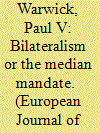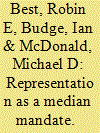| Srl | Item |
| 1 |
ID:
094957


|
|
|
|
|
| Publication |
2010.
|
| Summary/Abstract |
Michael McDonald and Ian Budge have recently advanced an interpretation of democratic governance based on what they term the 'median mandate'. This perspective locates the key element of liberal democracy in a close correspondence between government policy and the policy preferences of the median voter on the left-right scale. The cross-national evidence they produce in favour of this interpretation is impressive, but it largely hinges on a method for measuring the median voter position in each election that relies on the positions of the various parties in the election and the vote shares they received. This article examines the validity of the median mandate hypothesis when median positions are measured more directly from public opinion surveys (particularly, the Eurobarometer and Comparative Study of Electoral Systems series). The findings show that choice between distinct alternatives, rather than conformity to the median, more accurately characterises governance in democratic systems.
|
|
|
|
|
|
|
|
|
|
|
|
|
|
|
|
| 2 |
ID:
111497


|
|
|
|
|
| Publication |
2012.
|
| Summary/Abstract |
The extent and ways in which popular preferences influence government policy are absolutely central to our understanding of modern democracy. Paul Warwick's discussion of these in the European Journal of Political Research in 2010 puts itself at the heart of the debate with its critique of the median mandate theory of McDonald and Budge, proposing an alternative 'bilateralist' concept of representation. This article questions whether this concept has much to add to our theoretical understanding of representational processes. However, Warwick's further conceptual points deserve serious consideration. These concern the time horizons within which representative processes work, and the status of the median position given multi-motivated voting. At the evidential level, Warwick argues that survey-based measures of voter and party left-right positions fail to produce the correspondence between median and government policy positions that median mandate theory would have us expect. However, survey-based measures of median voter and party placements obscure important cross-national variation. Using the Comparative Study of Electoral Systems (CSES 2007), as Warwick does, this article shows that survey respondents norm their own and their country's party positions to their national context. The consequence is to make the political centre in all nations appear similar. Allowing for the relevant cross-national differences brings the relationship between the median voter and government position back in line with expectations.
|
|
|
|
|
|
|
|
|
|
|
|
|
|
|
|
| 3 |
ID:
111499


|
|
|
|
|
| Publication |
2012.
|
| Summary/Abstract |
The preceding article by Best, Budge and McDonald acknowledges much of the substance of the alternative 'bilateralist' interpretation of democratic governance I advocated and attempts to re-focus the median mandate approach towards a longer-term, and potentially more productive, understanding of the opinion-policy relationship. Both are welcome developments. Despite taking these steps, however, the authors choose to allow the fate of the median mandate thesis to rest ultimately on an attempt to re-establish the short-term one-to-one relationship that I challenged. In this brief note, I argue that this not only undercuts the more positive initiatives noted above, but also is based on a flawed understanding of how the short-term relationship should be operationalised and tested.
|
|
|
|
|
|
|
|
|
|
|
|
|
|
|
|